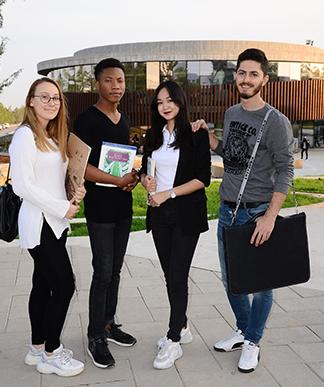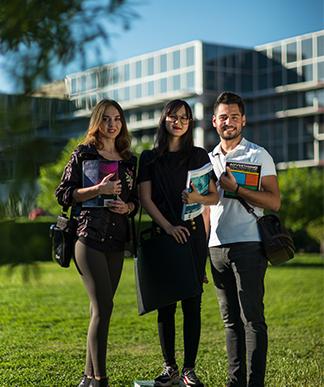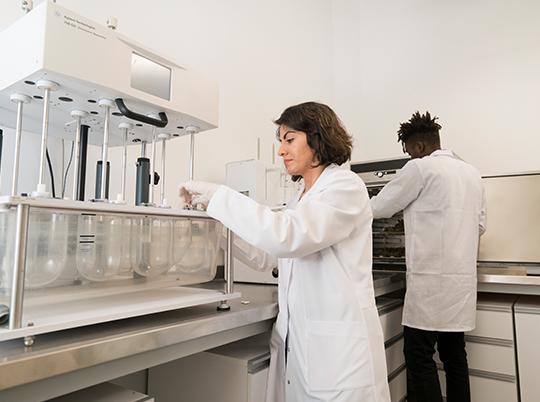


About the Program
The aim of the Ph.D. in Pharmaceutical Sciences program is to educate current and prospective pharmacists with pharmacy-related M.Sc. degree, with Ph.D.-level education in many fields of pharmacy such as pharmaceutical technology, pharmaceutical chemistry and pharmacology. The objectives of the program are to educate students who will play an important role in the development of our university and will further the scientific studies and contribute to the scientific literature. The mission of the program is to develop scientists who always follow the latest technological and scientific developments and adopt the philosophy of critical thinking with an evidence-based, multidisciplinary, collaborative thinking structure. The vision of the program is to pioneer the latest scientific developments, be the cornerstone of the scientific improvement of universities, and contribute to the production of quality science in the development of biomedical and pharmaceutical sciences in the world and the region.
Education Opportunities
Ph.D. in Pharmaceutical Sciences program aims to develop students in the field of pharmaceutics and provide them with a strong knowledge foundation. The curriculum consists of two compulsory courses in pharmaceutical sciences; technical elective courses on specific topics such as pharmacology, pharmaceutical technology, pharmaceutical chemistry, and pharmaceutical biotechnology; a seminar; and a thesis. The courses are chosen by the students in consultation with their course advisor and can be selected from the list of offered Ph.D. courses. Research methods course offered to the students target to improve students’ research abilities. A thesis supervisor who is an expert in their field is assigned to each student in order to assist the student in preparing the seminar and designing a plan of study for the thesis on a particular pharmaceutical sciences focus area. Students continue their laboratory studies in the modern laboratories of CIU, equipped with the most advanced equipment on the island.

Career Areas
Within the scope of the Ph.D. in Pharmaceutical Sciences, students will be able to solve problems in research and development studies and / or work in projects that will bring innovation to science and technology. It is possible to conduct some of these studies in related industries and abroad within the scope of international collaborations. Graduates of the Ph.D. in Pharmaceutical Sciences will be employed as academics in the faculties of pharmacy, health, engineering as well as being hired by drug and cosmetics industry, and in laboratories related to biomedical sciences. Ph.D. graduates of Pharmaceutical Sciences will be supported to take part in these fields and improve themselves. As a result, they would be highly experienced scientists and would also help our society in the fields related with pharmaceutics.
Contact
Institute of Graduate Studies and Research
Graduate Sciences and Education Center, GE106
Tel: +90 392 671 1111 Extension: 2776
Institute E-mail: ciu-institute@ciu.edu.tr
Compulsory Courses
First Semester
ADVANCED RESEARCH METHODS
Course code
PSCI601Credit
3Theoretical
3Practical
0Ects
8MOLECULAR APPROACHES IN PHARMACEUTICAL SCIENCES
Course code
PSCI611Credit
3Theoretical
3Practical
0Ects
8AREA ELECTIVE
Course code
PSCIXX1Credit
3Theoretical
3Practical
0Ects
8AREA ELECTIVE
Course code
PSCIXX2Credit
3Theoretical
3Practical
0Ects
8Second Semester
Philosophy of Science
Course code
PHIL601Credit
3Theoretical
3Practical
0Ects
8ADVANCED PHARMACEUTICAL AND BIOMEDICAL SCIENCES
Course code
PSCI602Credit
3Theoretical
3Practical
0Ects
8SEMINAR
Course code
PSCI690Credit
0Theoretical
1Practical
0Ects
4AREA ELECTIVE
Course code
PSCIXX3Credit
3Theoretical
3Practical
0Ects
8Third Semester
THESIS
Course code
PSCI600Credit
0Theoretical
0Practical
0Ects
160QUALIFYING EXAM
Course code
PSCI650Credit
0Theoretical
0Practical
0Ects
20Elective Courses
BASICS IN PHARMACOLOGY
Course code
PSCI624Credit
3Theoretical
3Practical
0Ects
8POISONOUS PLANTS
Course code
PSCI628Credit
3Theoretical
3Practical
0Ects
8CHRONOBIOLOGY AND CHRONOPHARMACOLOGY
Course code
PSCI623Credit
3Theoretical
3Practical
0Ects
8TECHNIQUES IN TISSUE CULTURE AND CELLULAR BIOENGINEERING
Course code
BIOE502Credit
3Theoretical
3Practical
0Ects
METABOLISM AND CELLULAR ADAPTATION
Course code
BIOE636Credit
3Theoretical
3Practical
0Ects
OPTICAL IMAGING TECHNIQUES
Course code
BIOE504Credit
3Theoretical
3Practical
0Ects
TECHNIQUES IN MOLECULAR BIOENGINEERING
Course code
BIOE601Credit
3Theoretical
3Practical
0Ects
MORPHOLOGICAL AND MICROSCOPIC DEFINITIONS OF VEGETABLE DRUGS
Course code
PRCO512Credit
3Theoretical
3Practical
0Ects
8MEDICINAL SIGNIFICANCE OF NATURAL PRODUCTS
Course code
PSCI607Credit
3Theoretical
3Practical
0Ects
FERMENTATION MICROBIOLOGY
Course code
BIOE531Credit
3Theoretical
3Practical
0Ects
CANCER BIOLOGY
Course code
BIOE628Credit
3Theoretical
3Practical
0Ects
ADVANCED PHARMACOGNOSY I
Course code
PRCO503Credit
3Theoretical
2Practical
2Ects
0RESEARCH ETHICS
Course code
PSCI605Credit
3Theoretical
3Practical
0Ects
8MOLECULAR MICROBIOLOGY AND MICROBIAL PATHOGENESIS
Course code
PSCI608Credit
3Theoretical
3Practical
0Ects
ADVANCED BIOTECHNOLOGY
Course code
PSCI609Credit
3Theoretical
3Practical
0Ects
8PHARMACEUTICAL TECHNOLOGY-II
Course code
PHAR305Credit
0Theoretical
0Practical
0Ects
0TECHNIQUES IN TISSUE CULTURE AND CELLULAR BIOENGINEERING
Course code
BIOE602Credit
3Theoretical
3Practical
0Ects
SPECIAL TOPICS IN BIOENGINEERING II
Course code
BIOE633Credit
3Theoretical
3Practical
0Ects
PHARMACEUTICAL TOXICOLOGY I
Course code
PHAR308Credit
0Theoretical
0Practical
0Ects
PHARMACOLOGY I
Course code
PHAR210Credit
0Theoretical
0Practical
0Ects
HEALTHCARE, TECHNOLOGICAL DEVELOPMENTS AND DIGITALIZATION
Course code
HCOM567Credit
3Theoretical
3Practical
0Ects
0INJECTABLE DOSAGE FORMS
Course code
PSCI619Credit
3Theoretical
3Practical
0Ects
8Philosophy of Science
Course code
PHIL601Credit
3Theoretical
3Practical
0Ects
8PHARMACOGNOSY-I
Course code
PHAR301Credit
0Theoretical
0Practical
0Ects
5PHARMACEUTICAL TECHNOLOGY-I
Course code
PHAR202Credit
0Theoretical
0Practical
0Ects
0PHARMACEUTICAL BIOTECHNOLOGY
Course code
PHAR401Credit
0Theoretical
0Practical
0Ects
0Students who are interested in pursuing advanced graduate studies leading to a master’s, doctoral degree or professional doctorate degree for the Fall and Spring semesters every year. Applicants can directly apply online to our graduate programs using the application portal.
TRNC Applicants- Required documents:
- Bachelor’s and Master’s Degree Diploma
- Bachelor’s and Master’s Degree transcripts for each completed academic term/year.
- Documents to prove English proficiency for English language departments,
- Scanned copy of passport or identity card.
Click for detailed admission requirements information.
Students who are interested in pursuing advanced graduate studies leading to a master’s, doctoral degree, or professional doctorate degree for the Fall and Spring semesters every year. Applicants can directly apply online to our graduate programs using the application portal.
International Applicants- Required documents:
- A valid Bachelor’s Degree and transcripts for each completed academic term/year.
- A valid Master’s Degree and transcripts for each completed academic term/year.
- Evidence of English Language competence: TOEFL (65 IBT) or IELTS (5.5). Students without these documents will take the CIU English proficiency exam on campus following arrival.
- Scanned copy of international passport/birth certificate
- CV
- Ph.D. research proposal
- Fully completed and signed CIU Rules and Regulations document (which can be downloaded during the online application)
Click for detailed admission requirements information.
Cyprus International University provides academic scholarships for its students as an incentive for success, with most students benefiting from 50%, 75% or 100% scholarships or discounted tuition fees. Click for more information.
Tuition Fees are determined at the beginning of each academic year. Candidate students who are entitled to enroll in CIU can learn their fees in line with the Tuition Fee Calculation system.